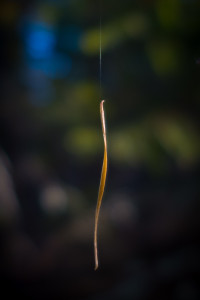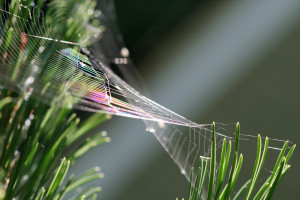“Go where they can’t find you,” she charged, and I fled to the cover of pine forest. Head down, heart pounding, I parted from the others and passed groups of children–the buzz of their giggling mixing with the light rain. I looked up briefly to scan faces. My own girls were not present, thank God. That would have been the end of this experiment in solitude. “Mama!” they would call. “Mama!!” more insistent if I did not answer the first time. “Mama!!!!” and I would once again be swept up into my routines of responding, all the constant demands, the pressure, the noise.
 Twenty minutes. I just needed twenty minutes away.
Twenty minutes. I just needed twenty minutes away.
I scanned the edges of the path and saw a row of faded red cabins stationed along the tree line. Here? Or should I keep going? These were unfamiliar woods and I didn’t know where everyone else was headed. But what if there were people staying in these cabins? No, they looked empty, alone like I longed to be. I just needed to decide quickly–already I could hear the crunch of gravel, moving in my direction. Just decide. Decide.
Slipping off the path, I jogged to the backside of a particularly abandoned-looking structure and crouched on the porch behind a low wall. Voices swept down the path I had just left, and I wondered if someone would make a turn for the woods and see me there, hiding. I pressed myself into the corner, back against the wall, and felt dampness seep through my jeans. Darnit. I was sitting in wet pine needles, but there was nowhere else to go. I closed my eyes, wishing them all away.
* * * * *
We were in the woods for a church retreat, the first retreat my small urban church has taken in the ten years I’ve been there. I was surprised by how many people signed up–when retreats had been proposed in the past they were quickly shot down with protests:
Nuh huh, I do not do spiders.
Do you really want to get eaten by some bear?
And my personal favorite:
Don’t you know there are crazy people in those woods? And no one, I mean No One, will even hear you scream.
But by some miracle there were seventy of us gathered for this weekend away. Granted, the hotel-like lodge and cottages represented the near-opposite of roughing it. The buildings were clean and new with sparkling bathrooms and spacious common areas.
The problem (for me) was that they were also full of people, and because the dorms were single-sex, I had the girls on my own. On the drive to camp, I had tried to explain my unease to my husband.
“I don’t want to do this,” I said, and he looked at me, confused. “Do what?” I stared hard at the highway, groping for the right words. “People,” I tried, “I can’t take this many people right now. Meals in the dining hall. Sleeping in dorms. Large group gatherings. Small group discussions. I, I… I just don’t want to be here. I’m not sure I can do this.”
It was mid-May, and the month had been full of marathons, figurative and literal. The school year was almost over, and every moment away from the kids was filled with summer preparations and other responsibilities. I was on overload–a lot had taken place, but I hadn’t had time to process it all. This combination is difficult for anyone, but murder for an introvert like me.
It’s like this: imagine my introverted brain as a water pipe building up internal layers of calcification. Any kind of stimulus–people, events, emotions–are the calcium deposits. As long as I have time to deal with them as they come–silence, journaling, walking, prayer–they don’t build up. But if I don’t, if they just keep coming, then the pipe gets clogged.
And when the pipe gets clogged I can’t think anymore. Or make good decisions. Or live with seventy other people and my kids in dorms, and discuss God or church or each other’s lives or whatever it was we were going to talk about all weekend.
However.
When you’re driving to camp with a trunk packed full of sleeping bags and two excited children jabbering away in the back seat, what you think you can do is no longer terribly relevant.
* * * * *
When our speaker introduced the weekend’s theme I didn’t know whether to laugh or to cry. “This weekend,” she said, “we are going to talk about solitude.”
Pulling out a book by one of my favorite writers, Henri Nouwen, she defined solitude as being alone with God and hearing that you are loved. If we didn’t take this time, she warned, we would try to find affirmation in the shifting sands of human relationships. If we didn’t begin with solitude, we could never find authentic community because we would always be trying to find our identity in other people. You need to get away, she said, and listen to the voice that has been speaking to you all along.
“So go”, she said, “Twenty minutes of solitude. Go where they can’t find you.” And she released us into the woods.
There at my faded red cabin, back pressed up against the low wall, it took a long time for my heart to stop thump-thumping in my chest. It took longer for my breathing to slow, and it took longer still for my thoughts to settle. By now I was crying, all the emotion of the month pushing out of me slowly. My mind was churning, but I didn’t have the energy to fight it anymore. I just sat and stared into the woods.
After a long time I noticed the swamp cabbage lining the creek bed. The leaves looked over-sized, like a prehistoric display in a museum. Suddenly, a bird chittered ten feet above my head. I laughed with surprise. The smell of the wet pine needles lifted up on a small breeze, and I breathed in a deep draught of humid air.
 The pipe was beginning to clear; there was room now to take it all in. There was room now to let some things go.
The pipe was beginning to clear; there was room now to take it all in. There was room now to let some things go.
I remembered our speaker’s words: Solitude is being alone with God and hearing that you are loved. I grinned and spoke to the sky, “You have anything you want to say?”
There was no response, but that was okay. I already knew.
Photos by Ed Suominen and Sharon Mollerus